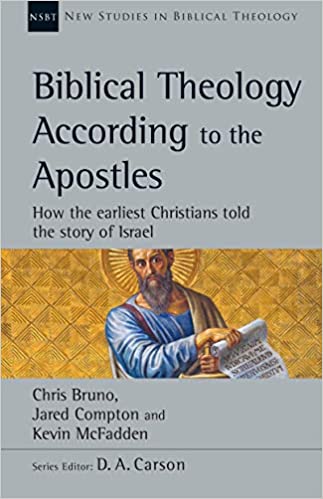A Book Review from Books At a Glance
by Mark Baker
Chris Bruno (Bethlehem College and Seminary), Jared Compton (Crossway Community Church), and Kevin McFadden (Cairn University) have teamed up to produce another excellent addition to IVP’s New Studies in Biblical Theology series. The recent literature in biblical theology is vast, and finding a good starting point can even seem overwhelming. Instead of just adding another book to the pile, the authors have presented a different approach: studying the visible tip of the iceberg, namely, the Bible itself. How did the authors of the New Testament engage in what we now know as “biblical theology”? The authors seek to answer this question by analyzing the “summaries of Israel’s story” (SIS) provided by the apostles.
In the introduction, the authors interact primarily with an article by Jason Hood and Matthew Emerson entitled “Summaries of Israel’s Story: Reviewing a Compositional Category.” With only a slight revision of passages, they analyze Hood and Emerson’s seven summaries of Israel’s stories in order to define the apostles’ approach to biblical theology. This method really is quite ingenious. It is simple without being simplistic, yet it is relatively untouched in the conversation on biblical theology. My one complaint regarding the authors’ method is that they provide only a nine-page introduction as an explanation. Only a specialist would be familiar with the literature on SIS, so most readers would have benefited from a slightly longer introduction so that readers can get their bearings.
The lion’s share of the book contains five chapters that cover all seven of the summaries of Israel’s stories. There are theological nuggets on every page, and readers will benefit from working through each chapter with Bible open and pencil in hand. Nevertheless, each of these five chapters is descriptive in nature and is driving toward the greater purpose that is brought to bear at the end of the book. The primary constructive work in the book is the conclusion, which puts forward a biblical-theological rule of faith. Christian interpreters are free to follow in the apostles’ footsteps, provided that they do “not contradict the points outlined in these summaries” (186). The authors also provide four observations of the apostles’ method that should influence Christian interpretation: (1) allegorical interpretation is a valid method, so long as it is “with a seatbelt”; (2) the biblical covenants serve as a “substructure” for the biblical plotline; (3) Old Testament promises were always pointing toward New Testament fulfillment, even if that fulfillment can only be clearly seen retrospectively; (4) Christian interpreters are free to contextualize Israel’s stories for their current situation (196-200).
Bruno, Compton, and McFadden have produced a concise presentation of biblical theology that directs the reader to the Scriptures themselves as the surest guide for the discipline. It is a compelling argument—so compelling that I often found myself wanting more. While the exegesis and theology in chapters 2-6 were quite interesting, the real payoff of the book comes in the sparsely-footnoted 18-page conclusion. It would have felt more satisfying to encounter a more robust conclusion including thorough interaction with key scholars in the field. I would have expected much more interaction with Richard Hays (there is just one cursory reference in the conclusion on p.192); the same could be said about Richard Longenecker (cf. 197n.11). Additionally, perhaps the authors could have provided a sample passage as a test case in which they employ their biblical-theological method.
These critiques should not overshadow my great appreciation for the book. I expect it will find its way on many college and seminary syllabi, and pastors and educated lay-people will also greatly benefit from this work. It is chock-full of theological nuggets, but its value is greater than the sum of these observations. It will train the reader how to understand the stories of the Bible the way the apostles did, and it will encourage them to be better handlers of the word of truth.
Mark Baker (PhD, Southeastern Baptist Theological Seminary) is assistant director and professor at the Southwestern Baptist Theological Seminary Darrington campus in Houston, TX.
Copyright 2021, Books At a Glance
